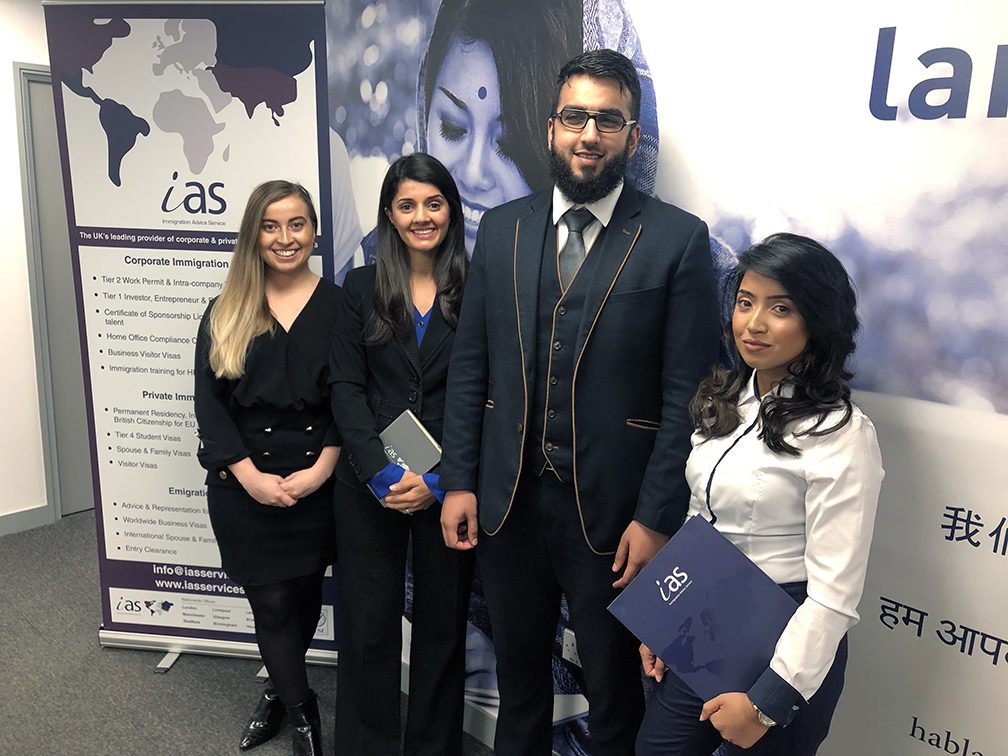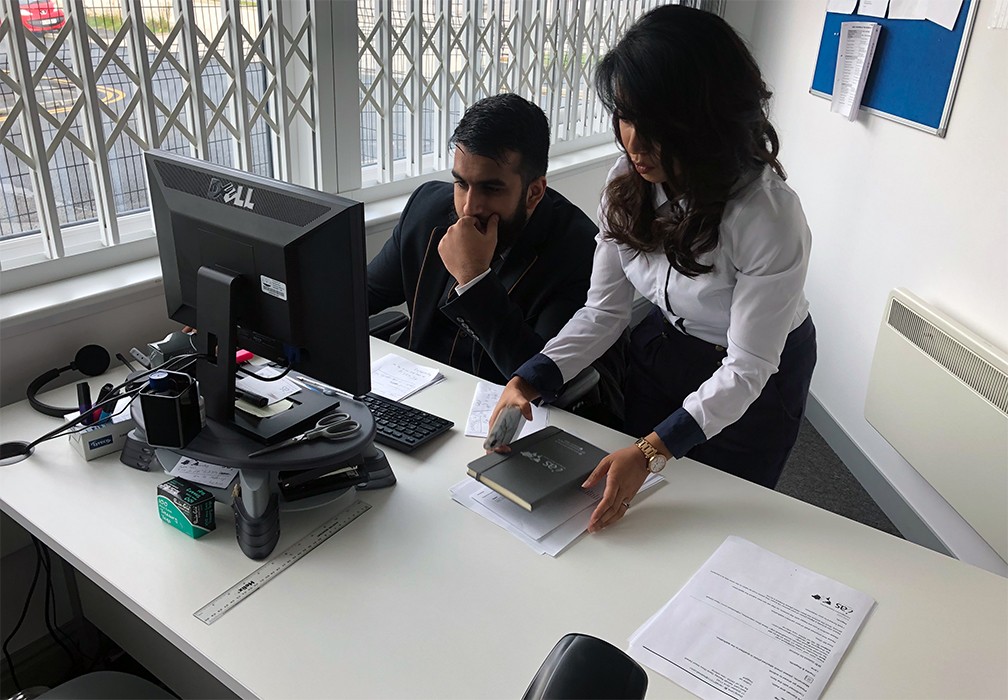US Immigration Lawyer
Are you interested in immigrating to the United States and need help with your application? Many people worldwide apply to immigrate to the US every year but not all applications are accepted.
Working with a specialist US immigration lawyer can help maximize your chances of a successful application. Call Total Law on +1 844 290 6312 for a confidential discussion about how we can help you and your loved ones settle in the United States.
Page Contents
How Can A US Immigration Lawyer Help Me?
Our team of qualified US immigration lawyers are ready to assist you with any visa or immigration matter.
Whether you require advice, application support, or assistance with an appeal, we can custom-make a specialist package to meet all your needs.
We provide support and advice on the immigration topics such as:
- Immigrating to the United States
- Emigrating from the United States
- Work visas
- Family and partner visas
- Permanent residency and citizenship
- Student visas
- Corporate immigration law
- Deportation and removal defence
One of our attorneys will work with you on your case to understand your situation, listen to your needs, analyse your eligibility, and give an insight into the likelihood of a successful application.
While no law firm can guarantee the success of an application, we can ensure that all the advice we provide is fully accurate and in line with US immigration law.
We can also help you to submit an application that is tailored to your chosen immigration route and is completed to the highest standard, as well as advise on the supporting paperwork needed to demonstrate you and your family members meet the strict criteria.
Which US Visa is Right for Me?
Immigrant Visas
There are several options if you intend to immigrate to the US with the aim of becoming a permanent resident.
Immigrant visa categories
| Immediate Relative/ Family Sponsored Visas | Visa Category |
| Spouse of U.S. citizens | IR1, CR1 |
| Spouse of U.S. citizens waiting for approval of their I-130 immigrant petition. | K3 |
| Fiancé(e) Visa | K1 |
| Intercountry adoption of an orphan child by a U.S. citizen | IR3, IH3, IR4, IH4 |
| Certain family members of U.S. citizens | IR2, CR2, IR5, F1, F3, F4 |
| Certain family members of lawful permanent residents (green card holders) | F2A, F2B |
| Employer Sponsored/ Employment Visas | |
Employment based immigrants including the following:
|
E1, E2, E3, EW3, C5, T5, R5, I5, S (multiple types) |
| Religious workers | SD, SR |
| Iraqi and Afghan translators/ interpreters | SI |
| Iraqis or Afghans who worked on behalf of the US government | SQ |
| Other immigrant visas | |
| Diversity immigrant visa | DV |
| Returning resident | SB |

Non-Immigrant Visas
If a non-immigrant visa is an appropriate route for you, there are many options to choose from. It is important to note that if you qualify for a non-immigrant visa, you will likely need to prove to immigration officials that you do not intend to move to an immigrant category.
However, some non-immigrant visas can permit you to stay legally for a number of years. During this time, you may become eligible to apply for a partner or spouse visa or an immigrant employment visa.
However, this mustn’t be your intended purpose when traveling to the US on some non-immigrant visas.
Non-immigrant visa categories
| Purpose of Travel | Visa Category |
| Athlete, amateur or professional (competing for prize money). | B1 |
| Au pair (exchange visitor) | J |
| Australian professional speciality | E3 |
| Border crossing card (Mexico) | BCC |
| Business visitor | B1 |
| CNMI-only transitional worker | CW1 |
| Crewmember | D |
| Diplomat or foreign government official | A |
| Domestic employee or nanny accompanying a foreign national employer | B1 |
| Employee of a designated international organization or NATO | G1-G5, NATO |
| Exchange visitor | J |
| Foreign military personnel stationed in the United States | A-2, NATO1-6 |
| Foreign national with extraordinary ability in sciences, arts, education, business, or athletics. | O |
| Free trade agreement (FTA) professional: Chile, Singapore | H1, B1 |
| International cultural exchange visitor | Q |
| Intra-company transferee | L |
| Medical treatment, visitor | B2 |
| Media, journalist | I |
| NAFTA professional worker (Mexico, Canada) | TN/TD |
| Performing athlete, artist, entertainer | P |
| Physician | J, H1B |
| Professor, scholar, teacher (exchange visitor) | J |
| Religious worker | R |
| Speciality occupations in fields requiring highly specialized knowledge | H1B |
| Student (academic, vocational) | F, M |
| Temporary agricultural worker | H2A |
| Temporary worker performing other services or labour of a temporary or seasonal nature. | H2B |
| Tourism, vacation, pleasure visitor | B2 |
| Training in a program not primarily for work | H3 |
| Treaty trader/ treaty investor | E |
| Transiting the United States | C |
| Victim of criminal activity | U |
| Victim of human trafficking | T |
| Non-immigrant visa for spouse and children of a lawful permanent resident. | V |
What Are The Requirements For Immigrating To The US?
The requirements for immigrating to the U.S. depend on the specific visa category that you are applying for. Each application is complex and requires a significant amount of information and documentation.
In general, some of the requirements for immigration include:
- Meet the age requirements of your chosen route.
- Meet the financial requirements of the immigration route.
- Demonstrate your relationship with your family relatives (where relevant).
- An approved petition from a family relative who is sponsoring you to come to the United States (where relevant).
What Documents Are Needed To Move To The US?
Providing evidence is a key part of the application process and it is essential to ensure you provide documents such as:
- Medical certificate showing proof of health status, and any required vaccinations
- Documents related to criminal history or previous immigration status (where relevant).
- Passport or valid travel document
- Proof of a formal job offer (if applying via the employment route).
- Letter from your sponsor organization outlining the nature of your employment
You will need to provide certified translations of any official documents that are not in English.
Can I Apply For A US Green Card?
There are several ways that you can apply for a green card in the United States. The ‘green card’ is also known as holding lawful permanent residence (LPR) in the US.
This is not the same as US citizenship, but it gives the cardholder more rights than if they were on a visa. To apply for a green card, you should be able to show your suitability under one of the following routes:
Green card through family
You may be able to apply for a green card if you fulfil the eligibility criteria. You should be one of the following:
- The immediate relative of a US citizen
- Other relative of a US citizen or LPR (family-based categories).
- Fiancé(e) of a US citizen or the dependent child of the fiancé(e)
- Widow(er) of a US citizen
- Victim of abuse from a spouse, child, or parent of a US citizen
Green card through employment
Some of the primary routes for employment-based green cards include:
- Immigrant worker (preference system)
- Physician national interest waiver (for physicians agreeing to work-time in a designated underprivileged area).
- Immigrant investor (for eligible individuals intending to invest at least $1 million in a new commercial enterprise (or $500,000 in an area of targeted employment)
Green card as a special immigrant
You may be eligible to apply as a special immigrant if the following apply to your case:
- Religious worker
- Special immigrant juvenile
- Eligible Afghanistan or Iraq nationals
- International broadcasters
- Employee of an international organization or family member or NATO-6 employee or family member
- Asylee (persons granted asylum status at least one year ago)
- Refugee
- Victim of human trafficking
How Can A US Immigration Lawyer Help Me?
All of our lawyers are fully accredited with the appropriate legal bodies and you may be confident that the information we provide is fully accurate.
No matter how complex your case is, we can provide a tailored plan to help you achieve your goals. We work tirelessly on your behalf, attempting all legal options to assist you in immigrating to the US with your loved ones and do our best to ensure that your petition is approved.
We recognize that immigration and visa applications are major decisions in a person’s life and that they can impact many lives.
That is why we provide the highest care and attention to all of our clients and ensure that they are given all their legal options so that they may make an informed decision about their future and the future of their families.
Your dedicated immigration lawyer will work with you throughout the entire process, communicating with you regularly to answer your questions and advise on the next steps. At the beginning of the process, you can expect us to give you clear and accurate information about how much the process will cost and an anticipated timeline.
If you have any questions at any stage, our friendly and professional client care teams can work directly with you so that you feel confident in the process. Call us on +1 844 290 6312 for a confidential discussion about how we can assist you with your immigration case.

Let Our US Immigration Lawyers Help You
At Total Law our US immigration lawyers are fully accredited and have a wealth of experience. Therefore, no matter what your immigration concern or issue is, we are well-equipped to provide the support you need when relocating to the US.
Call us on +1 844 290 6312 for a confidential discussion about how we can assist you with your immigration case. We look forward to assisting you over the phone, email or online.
Advice Package
Comprehensive immigration advice tailored to your circumstances and goals.
Application Package
Designed to make your visa application as smooth and stress-free as possible.
Fast Track Package
Premium application service that ensures your visa application is submitted to meet your deadline.
Appeal Package
Ensure you have the greatest chance of a successful appeal. We will represent you in any case.

The Advice Package
During this untimed Advice Session with our professional immigration lawyers in London, you will receive our comprehensive advice, completely tailored to your needs and your situation.

The Application Package
With our Application Package, your dedicated immigration lawyer will advise you on your application process and eligibility. Your caseworker will then complete and submit your forms to the Home Office on your behalf.

The Fast Track Package
Our Fast-Track Application Package is a premium service for those who need to submit their application in time with their deadlines. Your case will become a top priority for our lawyers and you will benefit from our highest-quality services.

The Appeal Package
By choosing our Appeal Package, you can rely on our lawyers’ legal knowledge and experience to ensure you have the highest chance of a successful appeal. We will also fully represent you in any hearings/tribunals.
Related pages for your continued reading.
Frequently Asked Questions
Our lawyers can help you with any aspect of immigration law, including family visa applications (and green cards). We can assess your eligibility for your chosen category and make recommendations if we believe there is a better option available for you to immigrate to the United States.
We provide all of the following services to help you apply for a family visa:
- Check that you have the required information and documents to submit with your application
- Complete all application forms on your behalf
- Monitor the family visa bulletins to check whether your visa application is current
- Liaise with you and your family members to keep you informed about your status
- Liaise with the visa application center and your U.S. embassy or consulate
- Contact you if your petition is approved or refused and outline the next steps
It can cost a lot of money to immigrate to the U.S and the amount will vary depending on your circumstances. Reach out to Total Law for tailored advice.
The knowledgeable team at Total Law are committed to help you and your loved ones in immigrating to the US.
We have a strong history in succeeding in applying for visas and immigration permissions and will work tirelessly on your behalf to achieve a positive outcome.
Our passion to providing high-quality advice is second to none and our dedicated USA immigration lawyers will work with you throughout the entire process,
It is possible to apply for a US visa without the assistance of an immigration lawyer. However, as US immigration law is extremely complex, with many rules that are updated regularly and which must be followed precisely, it can be difficult for a person without legal expertise to fully understand how to navigate the system.
As well as this, immigration applications can impact families lives and some people choose to rely on the expertise of an immigration lawyer to maximize their chances of a successful application.
If your application contains errors or inaccurate information (no matter how small), your entire application may be refused on this basis.
A qualified immigration lawyer will work with you to ensure that your application is submitted to the highest standard and contains no errors that could result in lost time or further expense.

